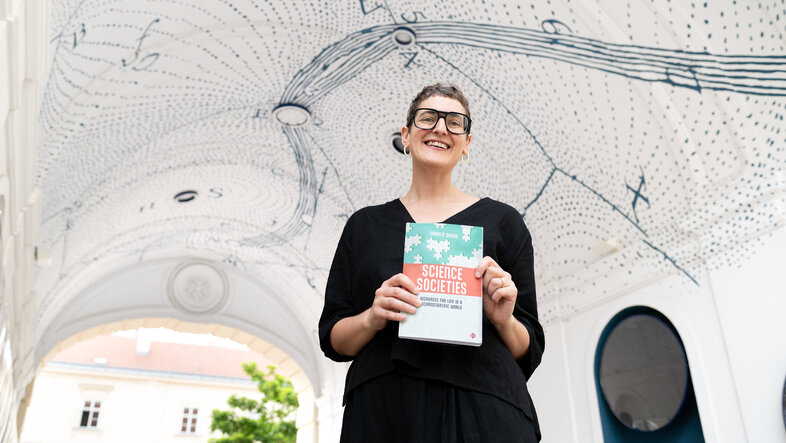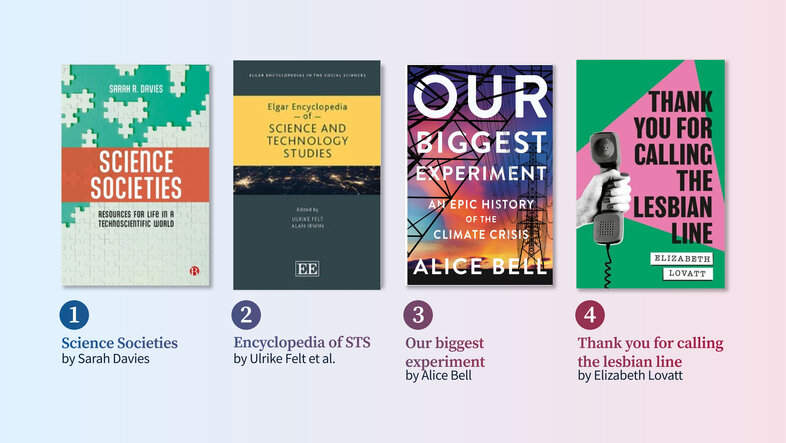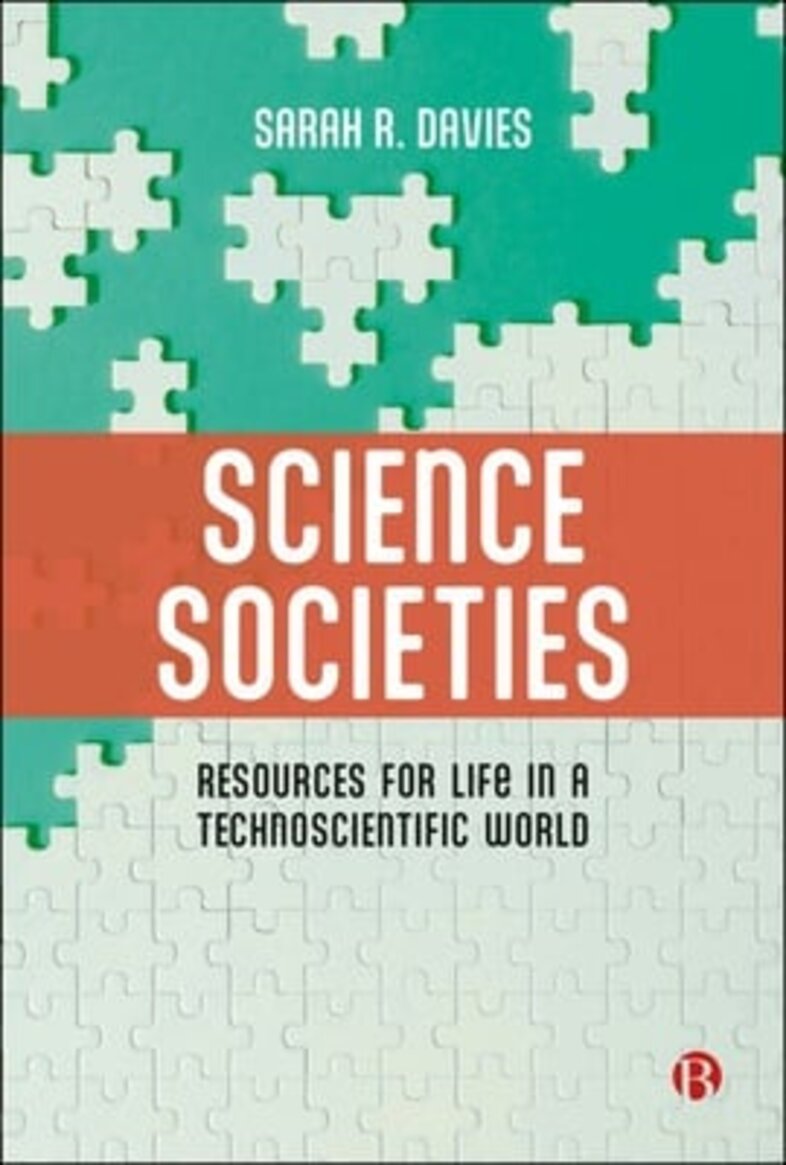Reading Science Societies with Sarah Davies
Rudolphina: You started writing your book in times of crisis, while the COVID-19 pandemic turned our lives upside down. What is your book about and why did you write it?
Sarah Davies: The book is about the kinds of societies we live in. One way of framing contemporary life is that many of our activities, experiences, and ways of making sense of the world are shaped by science and technology – so we could say we live in science (or technoscientific) societies. This was particularly visible during the pandemic, when expert advice and the changing state of scientific knowledge affected our lives in obvious ways, but it’s true generally, too. Technologies and scientific knowledge are all around us. I wanted to write a book that reflected on that, and that captured research about the relationships between science, technology, and society.
Rudolphina: In your book you explain that science and society are usually imagined as separate entities. For example, when we talk about the necessity of educating lay people about science, we seem to assume that they are outside of science. Why is this problematic?
Davies: A lot of the metaphors that circulate about ‘science’ and ‘society’ – such as the idea of the ivory tower, or research and society needing to be ‘bridged’ – emphasise that they are separate entities. While there are of course differences between scientific spaces and practices and those in non-scientific arenas, I think it is unhelpful to constantly emphasise their separation. Non-scientists are less likely to want to learn about and engage with science if we are consistently told that it is something drastically different to and separate from us, rather than something that we encounter every day.
Rudolphina: What is science’s relation to democracy? And why is the seeming disregard of facts or scientific consensus on the part of politicians, for example Donald Trump, a threat to democracy?
Davies: There is a long history of scientists and others reflecting on the role of science in democratic societies. For some, science is a kind of ‘special case’ for democracy – one where we should accept the views of experts and govern in technocratic, not democratic ways. Others have suggested that while science is a vital tool for government, it should also be subject to public reflection and debate.
In the current context we have seen the rise of what has been termed ‘science-related populism’, where populist movements reject or criticise mainstream science as well as (what they see as) political elites. In my view, it is vital is to understand where these developments emerge from, and why particular groups or actors are critical of science. Often it is not about science per se, but the institutions and structures that science is understood as being part of.
Rudolphina: Radical science was born in the 1960s when researchers were protesting against the use of science for military purposes. Do you think the times we live in today need more radical science to ensure that scientific research is used to support the public good?
Davies: I would love to see more radical science activities where researchers and research institutions consider how they can best serve public needs and engage with local communities. The organisation Science for the People is an important ongoing example of this. But the radical science movement was also a product of its time. It was closely connected to the other forms of civil rights, environmental, and progressive activism that were prominent in the 1960s and ‘70s.
The context for scientific research is now very different: researchers must ‘publish or perish’ in a hugely competitive, marketised, and innovation-oriented environment. While radical and participatory science continues, I think that the wider scientific reward system should be transformed to encourage more radical research, rather than putting the burden on individual scientists.
Exploring "Radical Science"
The social upheavals of the 1960s also influenced the scientific community, leading some scientists to challenge the conservative norms of mainstream science. Advocates of radical science questioned how research was funded and used, opposing its application in military contexts and promoting inclusion, such as supporting women in science. They also embraced the potential of science, experimenting with "community science" to make it more socially relevant.
Rudolphina: In your book you suggest a toolkit for living in a technoscientific world. Can you point out some strategies for our readers?
Davies: I think the most important strategy is to know more about technoscience – to have some insight into how it works, how it is governed and funded, and to understand that it is not separate from social life, but is shaped by particular social values and choices. The way that technoscience develops is not inevitable, but is the result of human choices. If we realise this, it becomes possible to reflect on how it might be different. In the book I write about data activism, for instance, which is a great example of citizens reflecting on how digital technologies are developing, some of the problems with this, and proposing changes (in the technologies themselves and how they are governed).
Rudolphina: Whom would you recommend your book to?
Davies: I wrote it with interested students, scientists, and the general public in mind – people who are not familiar with my field, Science and Technology Studies (STS), but are interested in thinking about the role of science in society. I try to capture the key scholarship from STS that helps us to understand the relationships between technoscience and society, and to write in an engaging and accessible way. So I hope that many people will read it!
Rudolphina: You describe your book as a starting point from which readers can travel to other literature. Which book do you recommend for readers who want to learn more about the topic?
Davies: This is a great question! There are not many texts which offer an overview, so for people who want to continue to understand what STS has to offer in terms of understanding the nature of technoscience and its role in society I would suggest the Encyclopedia of Science and Technology Studies.
For anyone interested in science communication specifically, I have edited another book, Exploring Science Communication, which includes some really interesting case studies. More topic-specific books include Our Biggest Experiment: An Epic History of the Climate Crisis, Race After Technology, Atlas of AI, or Science on stage: expert advice as public drama.
Rudolphina: What book is currently on your bedside table?
Davies: I always have an embarrassing pile of unfinished and unread books next to the bed. At the moment I am halfway through Elizabeth Lovatt’s memoir/social history "Thank you for calling the lesbian line", and looking forward to reading Laurent Binet’s novel "Perspectives".
About "Science Societies" by Sarah Davies
What role do science and technology play in society? What is the nature of expert knowledge? What is science’s relation to democracy? This introduction to science, technology, and society answers these questions, and more, by exploring contemporary research on topics such as expertise, activism, science policy, and innovation. It offers a comprehensive resource for considering the place that science and technology have in contemporary societies, and the roles that they can and should play. (from the publisher's website).
Her work explores how science and society are co-produced – how society defines the conditions of scientific research, and how science is present in wider society.


